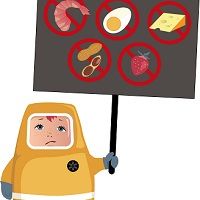Asthma Predisposition High Among Children With Food Allergies
The study claims to be “one of the largest primary care cohorts ever assembled to describe epidemiologic characteristics of healthcare provider-diagnosed eczema, asthma, allergic rhinitis, and food allergy.â€

Taking advantage of network data on over a million children, the Children’s Hospital of Philadelphia (CHOP) system was recently able to conduct a large, informative study on the most common chronic health afflictions that impact children.
From the wide swath of data, researchers assembled a closed-birth cohort of nearly 30,000 children, observed continually for their first 5 years of life, and a larger cross-sectional cohort of over 300,000, all observed for at least a year. The study claims to be “one of the largest primary care cohorts ever assembled to describe epidemiologic characteristics of healthcare provider-diagnosed eczema, asthma, allergic rhinitis, and food allergy.”
Among the first cohort, 8% were seen to develop a food allergy, as opposed to 6.7% in the larger cross-sectional cohort. The most common allergies were peanut, milk, egg, shellfish, and soy, with peak diagnosis typically before 24 months (except in the case of case of shellfish, with highest diagnoses between 24 and 29 months of age). They observed in the cross-sectional that those allergies mostly remained the most prevalent through adolescence.
Philadelphia has some of the highest asthma rates in the country, at around 21% of children, and the numbers were significantly higher amongst children with food allergies. Children with 1 diagnosed food allergy had a 26% chance of asthma, numbers which leapt to 40%, 49%, and 56% for those with 2, 3, or 4 allergies, respectively. Across the board, 35% of children with food allergies had asthma.
Rhinitis (commonly called “hay fever”) was also common amongst children with food allergies, also at about 35%. Incidence of childhood eczema, however, were down from previous studies. "Disease rates for these conditions seem to be changing, prompting a need for more information and surveillance,” said David A. Hill, MD, PhD, and one of the study’s authors.